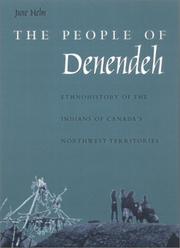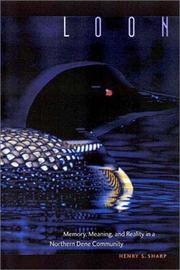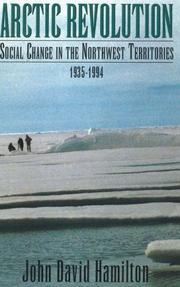| Listing 1 - 9 of 9 |
Sort by
|

ISBN: 1587293293 9781587293290 0877457352 9781587293795 9780877457350 Year: 2000 Publisher: Iowa City University of Iowa Press
Abstract | Keywords | Export | Availability | Bookmark
 Loading...
Loading...Choose an application
- Reference Manager
- EndNote
- RefWorks (Direct export to RefWorks)
For fifty years anthropologist June Helm studied the culture and ethnohistory of the Dene, "The People," the Athapaskan-speaking Indians of the Mackenzie River drainage of Canada's western subarctic. Now in this impressive collection she brings together previously published essays-with updated commentaries where necessary-unpublished field notes, archival documents, supplementary essays and notes from collaborators, and narratives by the Dene themselves as an offering to those studying North American Indians, hunter-gatherers, and subarctic ethnohistory
Ethnohistory --- Athapascan Indians --- Athabascan Indians --- Athabaskan Indians --- Athapaskan Indians --- Indians of North America --- Ethnohistorical method --- Historical anthropology --- Historical ethnology --- Anthropology --- Ethnology --- Social life and customs. --- History. --- Methodology --- Northwest Territories --- Territoires du Nord-Ouest --- North West Territories --- NWT --- N.W.T. --- GNWT --- Government of the Northwest Territories --- Government of the N.W.T. --- Government of Northwest Territories --- Gouvernement des Territoires du Nord-Ouest --- Nunavut

ISBN: 1280374152 9786610374151 0803202385 9780803202382 9781280374159 6610374155 0803242921 9780803242920 0803293216 9780803293212 Year: 2001 Publisher: Lincoln University of Nebraska Press
Abstract | Keywords | Export | Availability | Bookmark
 Loading...
Loading...Choose an application
- Reference Manager
- EndNote
- RefWorks (Direct export to RefWorks)
"In August 1975 at Foxholm Lake on the reserve of the Chipewyan, a Northern Dene people, in the Northwest Territories of Canada, anthropologist Henry S. Sharp and two members of the Mission Band encountered a loon. Loons are prized for their meat and skin, so the two Chipewyan tried - thirty times - to kill it. The loon, in a brazen display of power, thwarted these attempts and in doing so revealed itself to be a "spirit." In this book, Sharp embarks on a narrative exploration of the Chipewyan culture that examines the nature of a reality within which wild animals are both persons and spirits. In an unforgettable journey through the symbolic universe and daily life of the Chipewyan of Mission, his work uses the context and meaning of the loon encounter to show how spirits are an actual and almost omnipresent aspect of life.". "To explain how the Chipewyan create and order the shared reality of their culture, Sharp develops a series of analytical metaphors that draw heavily on quantum mechanics. His central premise: reality is an indeterminate phenomenon created through the sharing of meaning between cultural beings. In support of this argument, Sharp examines such topics as the nature of time, power, gender, animals, memory, gossip, magical death, and the construction of meaning. Creatively argued and evocatively written, his work presents a compelling picture of one people engaged in the human struggle to create meaning."--BOOK JACKET.
Chipewyan Indians --- Chipewyan mythology. --- Chipewyan philosophy. --- Chepewyan Indians --- Dene Indians (Chipewyan) --- Athapascan Indians --- Indians of North America --- Mythology, Chipewyan --- Philosophy, Chipewyan --- Philosophy, Canadian --- Social life and customs. --- Northwest Territories --- Territoires du Nord-Ouest --- North West Territories --- NWT --- N.W.T. --- GNWT --- Government of the Northwest Territories --- Government of the N.W.T. --- Government of Northwest Territories --- Gouvernement des Territoires du Nord-Ouest --- Nunavut
Book

ISBN: 2878548892 2878545451 Year: 2018 Publisher: Paris : Presses Sorbonne Nouvelle,
Abstract | Keywords | Export | Availability | Bookmark
 Loading...
Loading...Choose an application
- Reference Manager
- EndNote
- RefWorks (Direct export to RefWorks)
Cet ouvrage servira d'introduction à l'écrivain américain William T. Vollmann à travers l'étude d'un roman en particulier. The Rifles déconstruit le roman historique : à la suite de l'explorateur anglais du XIXe siècle John Franklin, le héros américain Subzero s'aventure sur ses traces dans l'Arctique, à la recherche d'un dépassement de soi. Il erre sur le permafrost de sa mémoire, à contre-courant de son histoire hégémonique, dont il brouille à dessein les pistes. Déployant une poétique de l'anachronisme, ce récit révèle le rêve de déculpabilisation de l'homme occidental, dans une récriture post-moderne du gothique. Entre l'esquive et l'engagement, entre la projection amoureuse et la réticence solitaire de l'explorateur aveugle, les voix de Vollmann cherchent l'Autre à travers les reflets fragmentaires d'un soi sans image, tel un nouveau cachalot blanc, après celui de Melville.
Explorers in literature. --- Inuit in literature. --- Vollmann, William T. --- Franklin, John, --- In literature. --- Arctic regions --- Northwest Territories --- Northwest Passage --- Franklin, Dzhon, --- Territoires du Nord-Ouest --- North West Territories --- NWT --- N.W.T. --- GNWT --- Government of the Northwest Territories --- Government of the N.W.T. --- Government of Northwest Territories --- Gouvernement des Territoires du Nord-Ouest --- Nunavut --- Arctic --- Arctic Ocean Region --- Arctic, The --- Far North --- The Arctic --- Polar regions --- The Rifles

ISBN: 9786611962302 1281962309 1554880785 1459713737 9781554880782 9781459713734 1550022067 9781550022063 Year: 1994 Publisher: Toronto [Ont.] Dundurn Press
Abstract | Keywords | Export | Availability | Bookmark
 Loading...
Loading...Choose an application
- Reference Manager
- EndNote
- RefWorks (Direct export to RefWorks)
This path-breaking book offers some no-nonsense truth about northern development.
Indians of North America --- Inuit --- Innuit --- Inupik --- Eskimos --- American aborigines --- American Indians --- First Nations (North America) --- Indians of the United States --- Indigenous peoples --- Native Americans --- North American Indians --- History. --- Politics and government. --- Culture --- Ethnology --- Northwest Territories --- Territoires du Nord-Ouest --- North West Territories --- NWT --- N.W.T. --- GNWT --- Government of the Northwest Territories --- Government of the N.W.T. --- Government of Northwest Territories --- Gouvernement des Territoires du Nord-Ouest --- Nunavut
Book
ISBN: 1487574657 9781487574659 9781487585266 1487585268 Year: 1968 Publisher: Toronto
Abstract | Keywords | Export | Availability | Bookmark
 Loading...
Loading...Choose an application
- Reference Manager
- EndNote
- RefWorks (Direct export to RefWorks)
In recent years northern development has increasingly become a controversial issue in Canadian federal politics: the ensuing confusion of economic arguments and political discussion demonstrates the disorderly and inaccurate thinking of most Canadians on the subject. Professor Rea points out that the development of northern Canada has not been the spontaneous natural process which many Canadians seem to think: this traditional view has over-emphasized the climate and other natural influences on development at the expense of the more powerful forces of constitutional law, government policy, native culture, and western technology. This study offers a more balanced interpretation of the processes of development which shaped and limited the growth of economic and political life in the Yukon and Northwest Territories between the 1890s and the early 1960s. Much emphasis is placed on the role of government policy which was one of "developmental laissez-faire" until after the Second World War. Until this time, Professor Rea points out, the government really had little idea of what to do with the north: its policy was to minimize the cost of maintaining control over these lands, to "protect" their native populations from outside influences, and not to hinder any private enterprise determined to undertake resource development in the area. This laissez-faire policy collapsed in the late 1940s. in subsequent years, and particularly as a direct result of the "Roads to Resources Programme" of the late 1950s, there has been a tremendous expansion of government activity in the areas of welfare services and public investments in transportation and electric power. Professor Rea examines the general effects of this programme on the growth of the north and suggests a basis upon which a new general policy for development might be evolved. This well-documented and challenging work is an invaluable contribution to the study of government policy and northern development and should be read by everyone concerned with the future of Canada.
POLITICAL SCIENCE / Political Economy. --- Northwest Territories --- Territoires du Nord-Ouest --- North West Territories --- NWT --- N.W.T. --- GNWT --- Government of the Northwest Territories --- Government of the N.W.T. --- Government of Northwest Territories --- Gouvernement des Territoires du Nord-Ouest --- Nunavut --- Economic conditions. --- Yukon --- Юкан --- I︠U︡kan --- Юкон --- I︠U︡kon --- Γιούκον --- Gioukon --- Jukonio --- Jukona --- Jukonas --- Јукон --- Jukon --- ユーコン準州 --- Yūkon junshū --- ユーコン --- Jukons --- 育空 --- Yu kong --- Yukong --- Yukon Territory --- E-books
Periodical
ISSN: 19296657 Year: 1988 Publisher: Whitehorse, Yukon : Northern Review Society
Abstract | Keywords | Export | Availability | Bookmark
 Loading...
Loading...Choose an application
- Reference Manager
- EndNote
- RefWorks (Direct export to RefWorks)
Northwest Territories --- Yukon --- Canada, Northern --- Territoires du Nord-Ouest --- Canada (Nord) --- Canada, Northern. --- Northwest Territories. --- Yukon. --- GNWT --- Government of the N.W.T. --- Government of the Northwest Territories --- North West Territories --- NWT --- Canada --- Canadian --- Northern Canada --- Arctic, Canadian --- Canadian Arctic --- Юкан --- I︠U︡kan --- Юкон --- I︠U︡kon --- Γιούκον --- Gioukon --- Jukonio --- Jukona --- Jukonas --- Јукон --- Jukon --- ユーコン準州 --- Yūkon junshū --- ユーコン --- Jukons --- 育空 --- Yu kong --- Yukong --- N.W.T. --- Nunavut --- Arctic regions --- Yukon Territory --- Arctic Regions --- Gouvernement des Territoires du Nord-Ouest --- Government of Northwest Territories --- Northern Canada. --- I͡Ukan --- I͡Ukon --- Yūkon junsh
Book
ISBN: 1283530317 9786613842763 0773581510 9780773581517 0886291186 9780886291181 0886291100 9780886291105 Year: 1990 Volume: 3 Publisher: Ottawa: Carleton university press,
Abstract | Keywords | Export | Availability | Bookmark
 Loading...
Loading...Choose an application
- Reference Manager
- EndNote
- RefWorks (Direct export to RefWorks)
A collection of papers on the process of devolution in the Yukon and Northwest Territories. Discusses many aspects of constitutional devolution including historical perspectives, effect on forest fire and wildlife management, healthcare, local government, oil and gas accords, regional development and politics. Includes references.
Decentralization in government --- Centralization in government --- Devolution in government --- Government centralization --- Government decentralization --- Government devolution --- Political science --- Central-local government relations --- Federal government --- Local government --- Public administration --- Northwest Territories --- Yukon --- Юкан --- I︠U︡kan --- Юкон --- I︠U︡kon --- Γιούκον --- Gioukon --- Jukonio --- Jukona --- Jukonas --- Јукон --- Jukon --- ユーコン準州 --- Yūkon junshū --- ユーコン --- Jukons --- 育空 --- Yu kong --- Yukong --- Yukon Territory --- Territoires du Nord-Ouest --- North West Territories --- NWT --- N.W.T. --- GNWT --- Government of the Northwest Territories --- Government of the N.W.T. --- Government of Northwest Territories --- Gouvernement des Territoires du Nord-Ouest --- Nunavut --- Politics and government. --- Decentralization in government - Northwest Territories. --- Decentralization in government - Yukon.
Book
ISBN: 1772124826 1772125393 9781772125399 Year: 2020 Publisher: Edmonton, Alberta
Abstract | Keywords | Export | Availability | Bookmark
 Loading...
Loading...Choose an application
- Reference Manager
- EndNote
- RefWorks (Direct export to RefWorks)
"A project originally conceived to document the biographies of Elders by the Gwich'in Social and Cultural Institute, Our Whole Gwich'in Way of Life Has Changed / Gwich'in K'yuu Gwiidandài' Tthak Ejuk Gòonlih is an invaluable compilation of historical and cultural information. The stories of twenty-three Gwich'in Elders from the Northwest Territories communities of Fort McPherson, Tsiigehtshik, Inuvik, and Aklavik talk about the pleasures of living and travelling on the land. Their distinctive voices speak to their values, world views, and cultural assumptions, while McCartney assists by providing context and background on the lives of the narrators and their communities. Scholars, students, and all those interested in Canadian/Northern history, anthropology, Indigenous Studies, oral history, or cultural geography will benefit from this critical resource. Contributors: Antoine Andre, Caroline Andre, Hyacinthe Andre, Annie Benoit, Pierre Benoit, Sarah Bonnetplume, Marka Bullock, Lydia Elias, Mary M. Firth, Sarah Ann Gardlund, Elizabeth Greenland, Gwich'in Tribal Council, Violet Jerome, Peter Kay Sr., Mary Rose Kendi, Leslie McCartney, Ruby McLeod, Catherine Mitchell, Eunice Mitchell, Joan Nazon, Annie Norbert, Marie Therese Remy-Sawyer, Alfred Semple, Sarah Simon, Ellen Vittrekwa, Jim Julius Vittrekwa."--
Indigenous peoples --- Gwich'in Indians --- Social life and customs. --- History. --- Northwest Territories --- Gwitchin Indians --- Kutchin Indians --- Loucheux Indians --- Athapascan Indians --- Indians of North America --- Ethnology --- Territoires du Nord-Ouest --- North West Territories --- NWT --- N.W.T. --- GNWT --- Government of the Northwest Territories --- Government of the N.W.T. --- Government of Northwest Territories --- Gouvernement des Territoires du Nord-Ouest --- Nunavut --- Indigenous teaching, first-hand account, traditional knowledge, fundamental virtues, testament of self-determination, identity, Caribou people, historical accounts, land, spirituality, cross-cultural understanding, Dene, North, oral tradition.
Book
ISBN: 0803277350 0803277377 9780803277373 0803274467 9780803274464 9780803277359 9780803277366 Year: 2015 Publisher: Lincoln University of Nebraska Press
Abstract | Keywords | Export | Availability | Bookmark
 Loading...
Loading...Choose an application
- Reference Manager
- EndNote
- RefWorks (Direct export to RefWorks)
"Denesuline hunters range from deep in the boreal forest far into the tundra of northern Canada. Henry S. Sharp, a social anthropologist and ethnographer, spent several decades participating in fieldwork and observing hunts by this extended kin group. His daughter, Karyn Sharp, who is an archaeologist specializing in First Nations Studies and is Denesuline, also observed countless hunts. Over the years the father and daughter realized that not only their personal backgrounds but also their disciplinary specializations significantly affected how each perceived and understood their experiences with the Denesuline. In Hunting Caribou, Henry and Karyn Sharp attempt to understand and interpret their decades-long observations of Denesuline hunts through the multiple disciplinary lenses of anthropology, archaeology, and ethnology. Although questions and methodologies differ between disciplines, the Sharps' ethnography, by connecting these components, provides unique insights into the ecology and motivations of hunting societies. Themes of gender, women's labor, insects, wolf and caribou behavior, scale, mobility and transportation, and land use are linked through the authors' personal voice and experiences. This participant ethnography makes an important contribution to multiple fields in academe while simultaneously revealing broad implications for research, public policy, and First Nations politics"-- "Participant ethnography of the subsistence hunting practices of a band of Denesuline in the Northwestern Territories"--
HISTORY / Canada / General. --- SOCIAL SCIENCE / Anthropology / Cultural. --- SOCIAL SCIENCE / Ethnic Studies / Native American Studies. --- Human ecology --- Ethnology --- Hunting and gathering societies --- Chipewyan Indians --- Subsistence hunting --- Caribou hunting --- Chepewyan Indians --- Dene Indians (Chipewyan) --- Athapascan Indians --- Indians of North America --- Big game hunting --- Subsistence harvest of wildlife --- Subsistence use of wildlife --- Hunting --- Subsistence economy --- Wildlife utilization --- Food gathering societies --- Gathering and hunting societies --- Hunter-gatherers --- Hunting, Primitive --- Cultural anthropology --- Ethnography --- Races of man --- Social anthropology --- Anthropology --- Human beings --- Ecology --- Environment, Human --- Human environment --- Ecological engineering --- Human geography --- Nature --- Social life and customs. --- Social aspects --- Effect of environment on --- Effect of human beings on --- Northwest Territories --- Territoires du Nord-Ouest --- North West Territories --- NWT --- N.W.T. --- GNWT --- Government of the Northwest Territories --- Government of the N.W.T. --- Government of Northwest Territories --- Gouvernement des Territoires du Nord-Ouest --- Nunavut --- Environmental conditions.
| Listing 1 - 9 of 9 |
Sort by
|

 Search
Search Feedback
Feedback About UniCat
About UniCat  Help
Help News
News